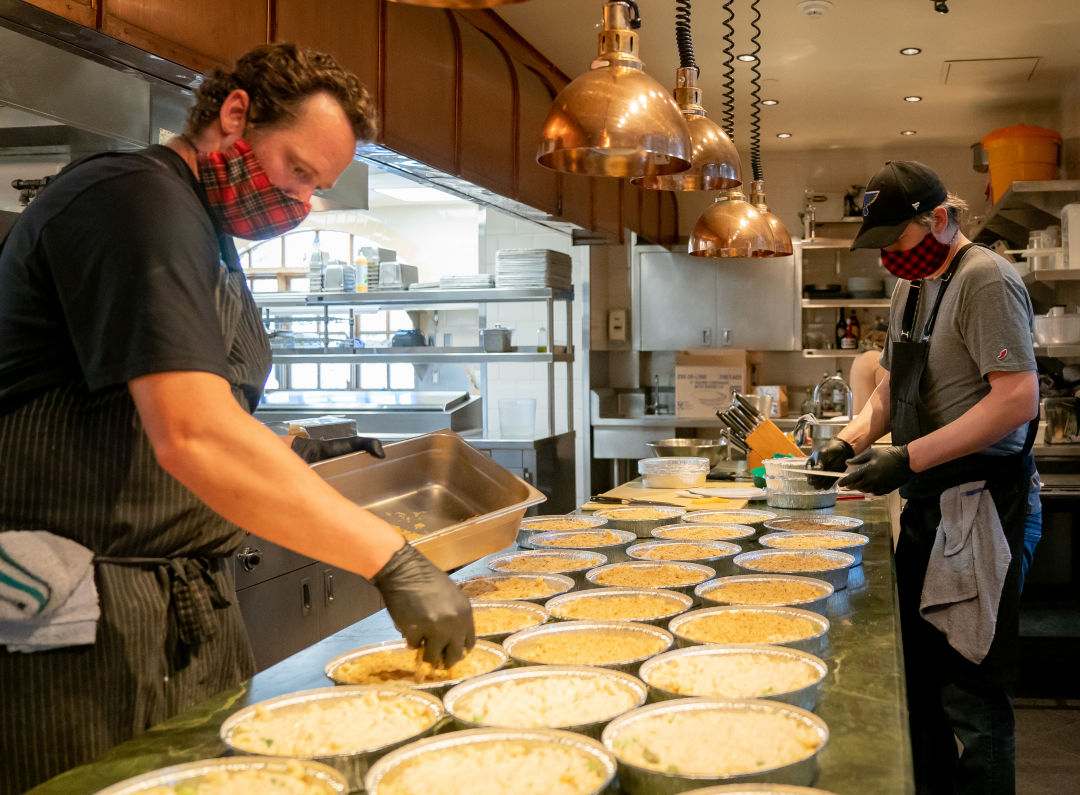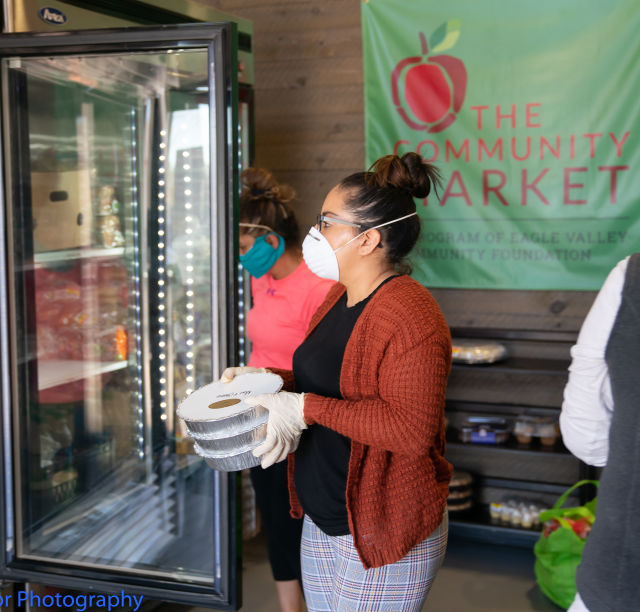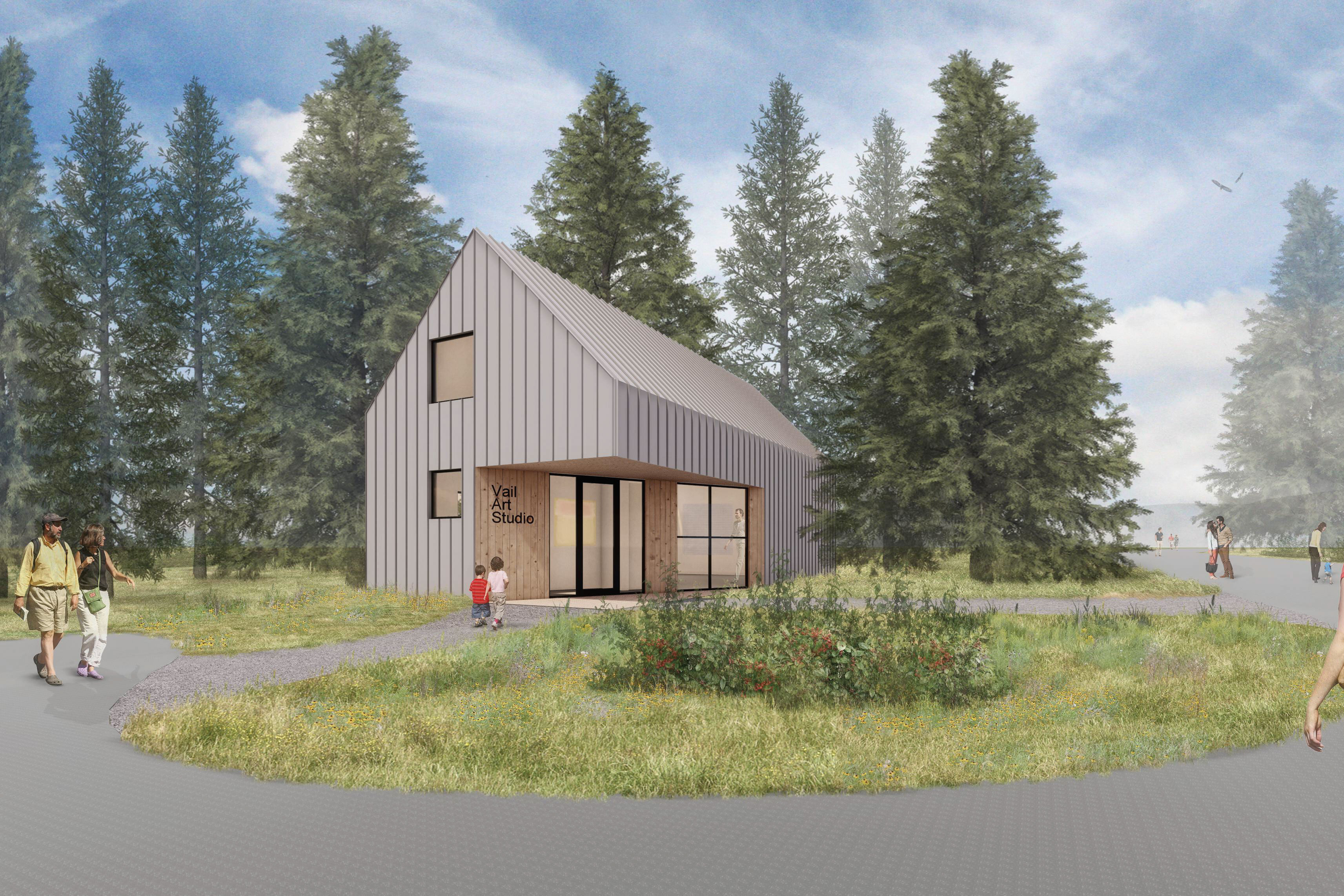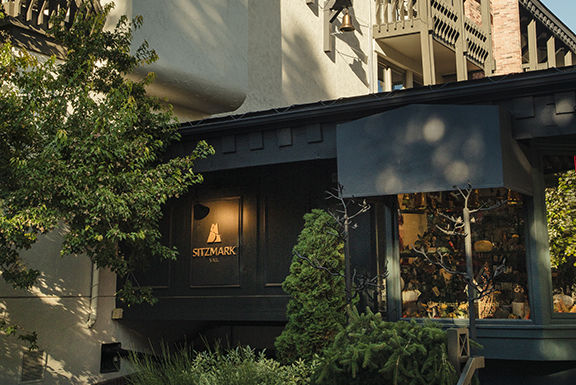Feeding Eagle County's Hungry

Splendido chef/owner Brian Ackerman (at right) assembles dozens of macaroni and cheese dinners that will be donated to out-of-work patrons that rely on Eagle's Community Market food bank for wholesome family meals during the pandemic.
Image: Dominque Taylor
She’ll remember it always: How every night through the height of the pandemic, like clockwork, a cacophony of coyote-like yips and yowls echoed through the valley at twilight. “It bounces off the mountains,” says Susie Davis in late May, marveling how Eagle County obliged the governor’s call to join a nation lifting its collective face to the sky at 8 p.m. nightly to (literally) howl their support for healthcare workers fighting on the front lines of a public health crisis. “If I’m driving, I stop to hear it—it’s just beautiful.”
Davis is the Director of Community Impact at the Eagle Valley Community Foundation, a nonprofit that operates an upscale food bank in Gypsum and Edwards as well as various pop-up locations around the valley that has played an increasingly critical role in feeding an army of service industry workers that haven’t collected a paycheck since March. Working alongside Davis as EVCF’s Food Systems Director is Vail restaurateur and celebrity chef Kelly Liken, who last summer signed on to rebrand the Eagle River Valley Food Bank as the Community Market. Unlike traditional food banks, Community Market customers aren’t required to provide financial records, identification, or address upon entrance. “‘No barriers’ is how I describe it,” Davis says. Instead, staffers only ask for first names (humanization), zip codes (statistics), and phone numbers (to be alerted when favorite items are back in stock). “We want to provide as much dignity and honor as possible,” Davis continues. “We’re not going to ameliorate poverty—we’re trying to honor people where they are.”
By making the experience more like a trip to Whole Foods—stocked with fresh produce donated by regional farmers and baked artisinal breads and hot meals from local restaurants instead of the usual boxes of Kraft mac-and-cheese, jars of Jif, and cans of Spaghettios—the Community Market has upended—some might say uplifted—the conventional food bank experience. “Healthy food should be accessible to everybody,” explains Davis. “It should be a right, not a privilege.”

A Community Market volunteer stocks refrigerator cases with Splendido's family meals.
Image: Dominique Taylor
Even before the pandemic, the Community Market was a vital resource for an alarming number of locals deemed “food insecure;” an incongruous statistic in a resort community known for unparalleled luxury is that 7.1% of Eagle County’s population lacks reliable access to affordable, nutritious food, nearly half of those with incomes below the federal poverty level. To better serve the valley’s skyrocketing food insecure population, the nonprofit opened a second bricks-and-mortar location in Edwards in May. “In February, we were feeding a little over 1,000 people a week,” Davis explains. “Now, we’re serving about 3,700.”
Usually the Market teems with eager volunteers, booms with loud music, and echoes with cheerful voices, but respecting physical distancing requires fewer staffers and more shifts. “I feel confident that we [are staying] open safely,” says Liken. Less manpower coupled with increasing demand put a strain on the Market, but Vail’s restaurants, bakeries, and culinary aficionados were quick to respond—despite personal struggles.
Splendido’s chef and owner, Brian Ackerman, former sous chef at Liken’s eponymous Vail Village restaurant (which closed in 2015), reached out to help his longtime friend and former boss in after his dining room closed in mid-March, and he was forced to lay off all but five of his staff of 50. Every Wednesday, Splendido delivered 30 hot meals to the Community Market; from chicken curry and seafood chowder to rich carbonara, Ackerman adapted Splendido’s signature flair to “stick-to-the-bones” comfort fare, served family-style. Being the restaurant business, he quips, “we’re like sharks—if we stop moving, we don't move anymore. So my whole team is more than happy to help out.”
Eli Gerstein, chef and owner of Mr. G’s Cuisine, a personal chef who cultivated a local following with a smoker he staged at special events around the valley, has donated 250 pounds of barbecue (in Liken’s words, “a ton of delicious brisket”) to the Community Market. Similarly, Gretchen Hovey, co-owner of market/cafe/bakery hybrid Hovey & Harrison throughout the pandemic weekly split 200 loaves of bread, 150 quarts of soup, and 120 meals between the Salvation Army and the Community Market. “It’s bigger than us,” says Hovey who furloughed 30 employees when her business closed to the public and transformed into a soup kitchen run by herself, a business partner (a former Sweet Basil bread baker), and one staffer. “It took a lot of work but it felt so good because we knew what good it was doing in the community.” The bakery’s locally famous salt bread quickly became a Community Market favorite.
“When customers come in and there’s a fresh-made meal ready to pop in the oven that night, it puts a smile on their faces,” Liken says. “It takes a little pressure off these workers who are juggling work, childcare, healthcare, and where their next paycheck is coming from.”
Even though more and more businesses are reopening as Eagle County relaxes its pandemic health restrictions (Hovey & Harrison reopened in mid-May, and Splendido plans to be busy throughout summer feeding Beaver Creek homeowners with takeout), local restaurants remain committed to serving the valley’s hungriest, and most vulnerable, population.
“We’re excited to further explore [restaurant involvement] because a lot of restaurants have stepped up,” says Davis, noting that at press-time at the end of May, its restaurant partnership program (which also includes Red Maple Catering and Vin 48) was providing 500 family meals each week. After all, even after the pandemic runs its course and life slowly begins to return to normalcy, hunger will persist. “I think we’ll see the restaurant and food service communities in Eagle County band together,” Liken predicts.
Just like that 8 p.m. howl, which to Davis, will always echo as collective resilience during the most trying, and perhaps finest moment, of this valley’s history. “I just feel like I know loud and clear how this community—it’s so cliché—how we are all in this together.”








































